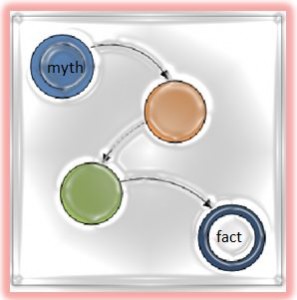Brain Myths about Learning and Teaching
 In the Next Brain Blog one of our goals is to help you apply the latest findings from neuroscience to improve or protect how well you think, learn, solve problems and make decisions on a daily basis. We want to use science to boost brain function and cognitive performance in very practical ways. One way to do that is to surface and debunk myths about the brain. So I am always on the lookout for scientific studies into myths about how our brains work.
In the Next Brain Blog one of our goals is to help you apply the latest findings from neuroscience to improve or protect how well you think, learn, solve problems and make decisions on a daily basis. We want to use science to boost brain function and cognitive performance in very practical ways. One way to do that is to surface and debunk myths about the brain. So I am always on the lookout for scientific studies into myths about how our brains work.
For example, a study published in Frontiers in Psychology examined how 242 teachers in Europe responded to common myths about how the brain works in education. The findings were striking. For example, 82% of the educators believe the myth of learning styles or:
“Individuals learn better when they receive information in their preferred learning style (e.g., auditory, visual, kinesthetic)”
This means even professional can fall victim to brain myths. Check out the myths below and see how they stack up to your beliefs. This is direct excerpt from the appendix of the paper:
- “Children must acquire their native language before a second language is learned. If they do not do so neither language will be fully acquired
- If pupils do not drink sufficient amounts of water (=6–8 glasses a day) their brains shrink
- It has been scientifically proven that fatty acid supplements (omega-3 and omega-6) have a positive effect on academic achievement
- We only use 10% of our brain
- Differences in hemispheric dominance (left brain, right brain) can help explain individual differences amongst learners
- The brains of boys and girls develop at the same rate
- Brain development has finished by the time children reach secondary school
- There are critical periods in childhood after which certain things can no longer be learned
- Individuals learn better when they receive information in their preferred learning style (e.g., auditory, visual, kinesthetic)
- Mental capacity is hereditary and cannot be changed by the environment or experience
- Environments that are rich in stimulus improve the brains of pre-school children
- Children are less attentive after consuming sugary drinks and/or snacks
- Exercises that rehearse co-ordination of motor-perception skills can improve literacy skills
- Learning problems associated with developmental differences in brain function cannot be remediated by education
- Short bouts of co-ordination exercises can improve integration of left and right hemispheric brain function
- When we sleep, the brain shuts down.”
Interested to hear from readers that have discovered and debunked brain myths. How did going from myth to fact help you improve your cognitive performance?

.…
ñýíêñ çà èíôó….
.…
thanks!…
.…
ñïñ….
.…
ñïñ çà èíôó!…
.…
ñïñ!!…
.…
áëàãîäàðñòâóþ!…
.…
good….
.…
áëàãîäàðþ!!…
.…
tnx for info!!…
.…
tnx for info!…
.…
thank you….
.…
ñïàñèáî çà èíôó!!…
.…
áëàãîäàðþ….
.…
ñïñ!!…
.…
ñïñ çà èíôó!…
.…
tnx….
.…
ñýíêñ çà èíôó!!…
.…
ñïñ çà èíôó!…